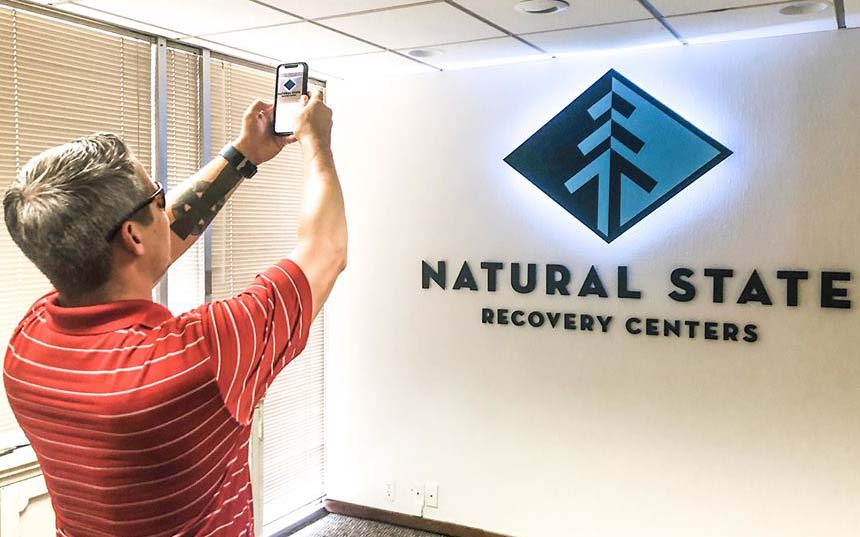Natural State Recovery Centers to help fight addiction, opioid crisis in Arkansas
July 9-15, 2018
By Becca Bona
According to the Center for Disease Control, Arkansas had the second-highest opioid prescribing rate in the country in 2016. Christopher Dickie, the CEO of Natural State Recovery Centers, plans to do something about it.
“We can’t talk about the problem without offering hope, because if there’s just the problem, then we stay in it and don’t try to do anything different,” says Dickie. “These people who are suffering need to know that hope does exist whether it’s with my program or just by asking for help.”
Natural State Recovery Centers opened their doors to Little Rock in June. With a three step system to treat substance abuse in any form – from opioids to alcohol, meth, and beyond, the staff is ready to help those in need.
Dickie goes on to note that of those who need treatment for substance abuse, 90 percent of people don’t get it. Rather, only 10 percent who need treatment seek it.
“That’s a staggering statistic,” he says.
An Oregon native, Dickie traveled many paths before opening Natural State Recovery. He’s spent years working in higher education with the University of Arkansas school system, and at one time, was also a business owner.
Part of the catalyst for opening Natural State Recovery came from first-hand knowledge of how difficult seeking help for addiction can be, locally.
“I saw the gaps in service that I wanted to fill. I knew that there was an issue, because a college friend of mine [who] was so connected to resources had nowhere to turn and it was a blindside to her family.”
Dickie based the structure of Natural State Recovery on different working models he saw across the country. He also drew on his personal experience, because as someone in long-term recovery himself, he can attest to the importance of each element.
These three steps are not linked elsewhere in Arkansas, but when combined work to build a solid foundation for long-term recovery.
The first step includes therapeutic services, which can be utilized as outpatient services as well as inpatient.
“We’re what would you would call an extended stay program, but in some cases we’re an alternative to inpatient services. Typically, people have to leave the state to find quality inpatient treatment,” he says. “There’s some quality here, but usually the beds aren’t available.”
The second step involves recovery housing. Dickie explains the importance of sober living, saying, “You are with a community that is like-minded and trying to put themselves back together. You’re got an accountability source – a place to learn about discipline and structure.”
The final element includes life skills training, such as financial literacy, college exploration, career assessment, and volunteerism. “People who tend to struggle with addiction also struggle to lead structured and disciplined lifestyles,” says Dickie. “I’ve always said sobriety is more than being sober. It’s more than a clean drug test. Helping someone get a job starts the process of building a life that’s worth living and gets them away from what was so familiar in those habits that they had in that old, unstructured lifestyle.”
Beyond the three step system, Natural State Recovery offers another layer which sets the center apart. “A large majority of our medical team at the clinic are also in long term recovery. That’s a critical layer,” says Dickie. There is a balance between staff members that are in recovery and those who are not, but this small element adds a layer of understanding towards those seeking help.
In the making for over two years, Dickie has overcome challenges getting the Little Rock Center off the ground. After working with the state to obtain medical compliance as well as watching the renovated sober living center come to life – he’s thrilled to see Natural State Recovery materializing. And, keeping it in the Natural State is key, as the hope is to eventually open other centers throughout Arkansas.
Dickie is not one to back down, and he hopes that those looking for help, inspiration, and hope can find it in Natural State Recovery Centers – from the staff to the name, which has its own meaning beyond the state of Arkansas.
It all has to do with hope, as he explains, “The word restore, if you look it up in the dictionary is ‘to return to it’s original condition’ […] and when you can come to believe that a power greater than you that can restore sanity, that’s where hope leads to new life.”
For more information, visit naturalstaterecovery.com., or make plans to stop by the 3600 Cantrell Road location for the Open House on July 12 at 4 p.m.
PHOTO CAPTION:
Dickie photographs the new sign at Natural State Recovery Centers inaugural location on Cantrell Road.



